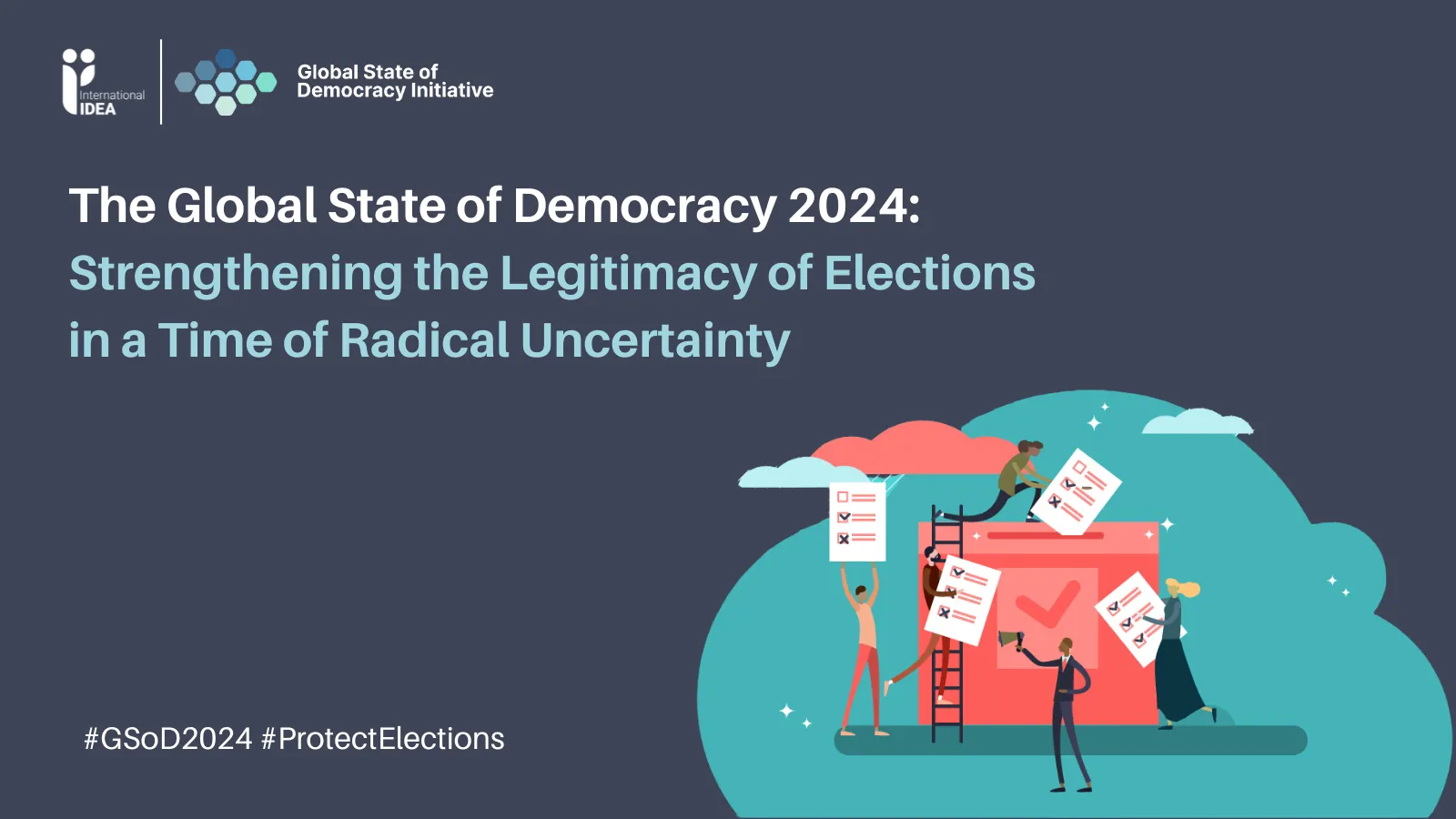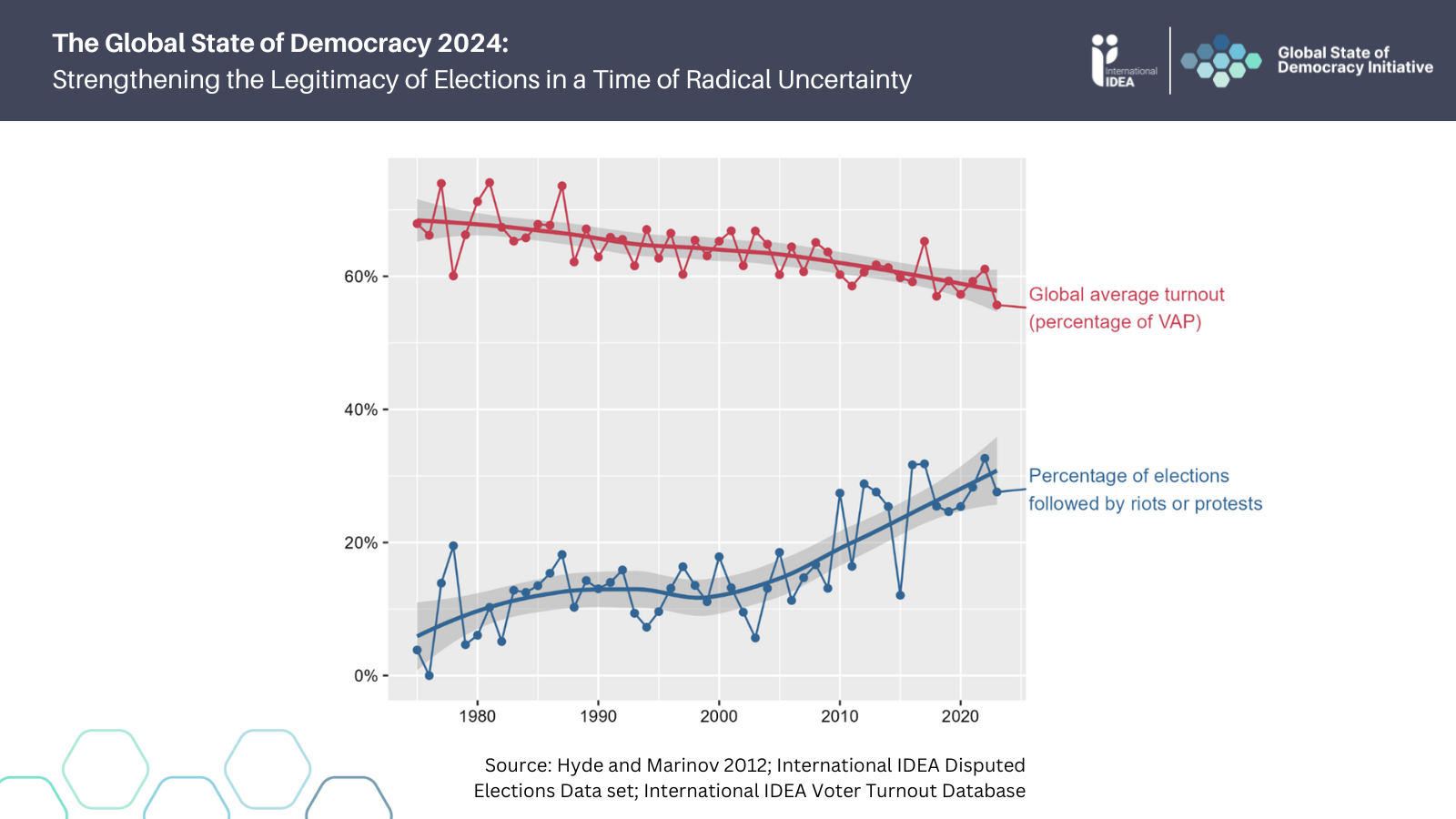
STOCKHOLM, 17 September 2024 – The credibility of elections is under threat globally as fewer people turn out to vote and results are increasingly contested. Almost one in three voters this year is casting a ballot in countries where election quality is worse than five years ago, according to a report by the International Institute for Democracy and Electoral Assistance (International IDEA).
The deterioration in election quality is part of a global trend of democracy under strain, with 47 per cent of countries declining in at least one key indicator of democratic performance over five years, based on categories ranging from Civil Liberties to Judicial Independence, the Stockholm-based intergovernmental organization said.
The year 2023 was the eighth consecutive year with more countries showing a decline rather than improvement in overall democratic performance, the longest consecutive fall since International IDEA’s records began in 1975, according to The Global State of Democracy 2024 Report (GSoD): Strengthening the Legitimacy of Elections in a Time of Radical Uncertainty.
‘This report is a call for action to protect democratic elections,’ said International IDEA’s Secretary-General, Kevin Casas-Zamora. ‘Elections remain the single best opportunity to end democratic backsliding and turn the tide in democracy’s favour. The success of democracy depends on many things, but it becomes utterly impossible if elections fail.’
The category of democracy related to free and fair elections and parliamentary oversight suffered its worst year on record in 2023 amid growing government intimidation and electoral process irregularities. Threats of foreign interference, disinformation and the use of artificial intelligence in campaigns have added to electoral challenges. The declines span both traditionally strong democracies as well as fragile governments around the globe.
The United States’ democratic performance has recovered in the past two years, but the assassination attempt on former President Donald Trump highlights continued risks. Scores in Credible Elections, Civil Liberties and Political Equality have not yet returned to their pre-2016 high levels. Less than half (47 per cent) of the Americans said the 2020 election was ‘free and fair’ and the country remains deeply polarized, according to another study from International IDEA.
The GSoD report also highlights positive developments for democracy. Elections have been critical in many recent success stories, including in India, Poland and Senegal. Other countries have seen broader improvements in democratic quality, including Brazil, the Dominican Republic and Fiji.
Key findings
- Globally, in almost 20 per cent of elections between 2020 and 2024, one of the losing candidates or parties rejected the results, and elections are being decided by court appeals at the same rate. In total, one in three elections was disputed in some way, from boycotts to legal challenges.
- The global average percentage of the voting age population who vote has declined from 65.2 per cent in 2008 to 55.5 per cent in 2023 (see Figure 1).
- Only one in four countries is making progress in democratic performance while four out of every nine are worse off.
- In 2023, the Credible Elections indicator was significantly lower in 39 countries (21 in Africa) than in 2018. Only 15 countries had higher scores than five years before.
- Declines have been most concentrated in Representation and Rights categories. Within Representation, the factors of Credible Elections and Effective Parliament have declined the most, while Economic Equality, Freedom of Expression and Freedom of the Press are the most negatively affected aspects of Rights.
Figure 1. Trends in electoral turnout and post-election riots and protests
Sources: Hyde, S. D., Marinov, N., NELDA 6.0,
Background
The Global State of Democracy 2024 Report ranks countries in four major categories of democratic performance rather than one overall classification. These four categories are:
Representation — which includes credible elections and effective parliamentary oversight;
Rule of Law — such as judicial independence and the degree to which people are free from political violence;
Rights — including freedom of expression and freedom of assembly; and
Participation — how involved citizens are in democratic expression during and between elections.
Regions
Africa – Democratic performance in most countries has been stable over the past five years. The major regional exception, however, is the Sahel, where coup-affected countries such as Burkina Faso have experienced declines. Twenty-one countries experienced significant declines in the credibility of elections. The average Participation score in Africa declined between 2018 and 2023, although many countries perform at a higher level in this category than they do in other categories. Both Burundi and Zambia have experienced significant improvements in their performances across multiple factors, when compared to 2018, albeit from a low-starting point in the case of Burundi.
Western Asia – The region remains largely non-democratic, with countries experiencing few declines or improvements between 2018 and 2023. More than a third of the region is low-performing in all categories of democratic performance, with Representation the standout in this regard (64 per cent of countries in the region are low-performing in this category).
Europe – More countries are declining than advancing across two-thirds of the measured aspects of democracy, with particularly stark negative balances in Rule of Law, as well as Civil Liberties and Access to Justice. Only two measures, Gender Equality and Effective Parliament, saw more countries advancing than declining over the last five years. While Central Europe accounts for over half of the significant advances in Europe (with Montenegro and Latvia leading), Moldova, an Eastern European country, stands out with the biggest number of advances in Europe.
The Americas – Most countries have maintained a stable level of democratic performance over the past five years. However, there have been declines in several mid-range and low-performing countries such as Peru, as well as high-performing countries such as Uruguay. More countries have experienced net declines—falling behind in more areas than they are making progress—than net advances. Rule of Law stands out due to the large number of countries declining in this area. Other areas with negative trends include Free Political Parties, Elected Government, Effective Parliament, Civil Liberties—particularly Freedom of the Press—and Economic Equality.
Asia and the Pacific – Most countries have seen small declines or remained relatively stable over the past five years. Most five-year declines in measurements of Representation were seen in Credible Elections and Effective Parliament, with the latter measure seeing declines in Japan, Kyrgyzstan, Nepal and South Korea. Only Fiji, the Maldives and Thailand have seen clear improvements across the indices. The slight downward trend was not limited to low-performing states like Afghanistan and Myanmar (countries that experienced the worst net declines in the region), as several mid-range performing countries, such as Kyrgyzstan, are all experiencing net declines in several indicators.
LAUNCH QUICK LINKS
GSoD 2024 event livestream on YouTube
Key hashtag to follow on social media: #GSoD2024





